
Language and Linguistics
Scope & Guideline
Unraveling the Complexities of Language and Communication
Introduction
Aims and Scopes
- Structural Analysis of Languages:
The journal consistently publishes papers that analyze the syntactic and morphological structures of various languages, particularly Mandarin, Tibetan, and other East Asian languages, contributing to the field of comparative linguistics. - Semantic and Pragmatic Studies:
A significant focus is placed on the semantics and pragmatics of language use, including the examination of modal expressions, evidentiality, and discourse markers, which enhances the understanding of meaning in context. - Historical Linguistics and Language Change:
Research on diachronic aspects, including the evolution of grammatical structures and phonological changes over time, is a core area, providing insights into the historical development of languages. - Typological and Comparative Linguistics:
The journal emphasizes typological studies that compare linguistic features across languages, particularly within the Sino-Tibetan language family and East Asian languages, fostering a deeper understanding of linguistic diversity. - Cultural and Contextual Language Use:
Papers often explore the intersection of language with culture, examining how linguistic practices are influenced by social and contextual factors, which is crucial for understanding language in its real-world applications.
Trending and Emerging
- Cross-Linguistic Pragmatics:
There is a growing interest in pragmatics across different languages, particularly in how contextual factors influence meaning and usage, which is crucial for understanding communication in multilingual contexts. - Cognitive Linguistics:
An emerging trend is the application of cognitive approaches to language, exploring how mental processes shape linguistic structures and usage, indicating a shift towards interdisciplinary research that connects linguistics with psychology. - Grammaticalization and Language Change:
Increased attention is being given to grammaticalization processes, particularly in how languages evolve over time, reflecting a broader interest in historical linguistics and the mechanisms of language change. - Empirical and Experimental Methods:
There is a noticeable rise in studies employing empirical and experimental methodologies, including corpus-based analyses and psycholinguistic experiments, which provide robust data to support theoretical claims. - Language and Identity:
Research exploring the relationship between language and identity, including how language reflects and constructs social identities, is gaining traction, emphasizing the socio-cultural dimensions of linguistic study.
Declining or Waning
- Traditional Grammar Frameworks:
Research grounded strictly in traditional grammatical frameworks appears to be declining, as newer studies increasingly adopt more dynamic and interdisciplinary approaches to understanding language. - Descriptive Studies of Less Common Languages:
Although some descriptive studies of less common languages were previously featured, there has been a noticeable reduction in such publications, possibly due to a shift towards more widely spoken languages and comparative analyses. - Phonetic and Phonological Detail Studies:
There has been a decrease in the number of papers focusing solely on detailed phonetic and phonological analyses without broader implications or connections to semantic or syntactic studies, indicating a trend towards integrative research. - Static Language Models:
Research that relies on static models of language without considering the dynamic and evolving nature of linguistic usage is becoming less frequent, as scholars increasingly recognize the importance of context and change.
Similar Journals
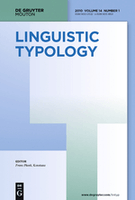
Linguistic Typology
Illuminating the Complexities of Linguistic DiversityLinguistic Typology is a premier journal focused on the comparative study of language structures and the classification of languages, published by Walter de Gruyter GmbH in Germany. Since its inception in 1997, the journal has established itself as a leading platform in the field of linguistics, achieving a remarkable Q1 category ranking in both Linguistics and Language for 2023, reflecting its impact and relevance among scholars. With a notable position in the academic community, evidenced by its 91st percentile rank in Arts and Humanities and 90th percentile in Social Sciences according to Scopus, Linguistic Typology invites contributions that explore the rich diversity of language structures, promoting a deeper understanding of linguistic phenomena across various cultures. While currently not offering open access, the journal remains a pivotal resource for researchers, professionals, and students aiming to advance their knowledge in the dynamic field of linguistics. For more information, deliverables, and submission guidelines, please visit the journal's official page.
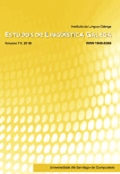
Estudos de Linguistica Galega
Innovating the Discourse in Linguistics and LanguageEstudos de Linguistica Galega, an esteemed journal published by the University of Santiago de Compostela, provides a critical platform for scholars engaged in the vibrant field of linguistics, particularly focusing on the Galician language and its surrounding linguistic phenomena. Launched in 2009, this Open Access journal enables unrestricted dissemination of research, facilitating engagement from a global audience. With an impact factor that positions it within the Q4 quartile in Linguistics and Language, it reveals a strong commitment to advancing the discourse in this niche. It ranks #691 out of 1088 in the Arts and Humanities category, underscoring its relevance in the academic landscape. The journal aims to foster collaboration and innovation among researchers and practitioners, making significant contributions to understanding linguistic diversity and its implications in contemporary society. Located in Santiago de Compostela, Spain, the journal encourages submissions that explore theoretical, empirical, and applied linguistic studies, thereby inviting researchers, professionals, and students to contribute to this growing field.

SKASE Journal of Theoretical Linguistics
Expanding the Frontiers of Linguistic ThoughtSKASE Journal of Theoretical Linguistics, published by the SLOVAK ASSOCIATION STUDY ENGLISH-SKASE, is a distinguished Open Access journal that expands the horizons of linguistic research and theoretical frameworks. With its ISSN N/A and E-ISSN 1336-782X, the journal has established itself as a pivotal resource for scholars in the field, achieving a commendable Q2 ranking in Linguistics and Language as of 2023. The journal, which has been in continuous publication since 2017, actively publishes innovative research studies, reviews, and theoretical discussions, easing access to groundbreaking work for academics and practitioners alike. Based in Slovakia, it connects a rich heritage of linguistic scholarship and is indexed in Scopus, ranking alongside its peers in both Arts and Humanities and Social Sciences categories. The SKASE Journal of Theoretical Linguistics is crucial for anyone interested in the evolving landscapes of linguistics, serving as an invaluable platform for disseminating knowledge and fostering collaboration amongst researchers worldwide.
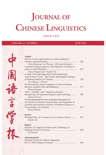
JOURNAL OF CHINESE LINGUISTICS
Illuminating the Structures and Contexts of the Chinese LanguageJOURNAL OF CHINESE LINGUISTICS, published by the JOURNAL CHINESE LINGUISTICS, is a prominent periodical that serves as a vital resource for researchers and scholars in the fields of linguistics and Chinese studies. With its ISSN 0091-3723, this journal has been contributing to the academic community since 1996 and continues to publish innovative research until 2024. Although it is classified in the third quartile (Q3) for both Arts and Humanities and Linguistics categories, its focus on Chinese linguistics positions it uniquely within this specialized domain. The journal is committed to advancing the understanding of Chinese language structures, usage, and context, encouraging interdisciplinary dialogue among linguists and language researchers. While currently not labeled as open access, the journal remains accessible to institutions and scholars worldwide, creating an invaluable platform for disseminating knowledge. As such, it plays a critical role in promoting linguistic diversity and cultural awareness within the academic landscape.

Voprosy Yazykoznaniya
Unveiling the Complexities of CommunicationVoprosy Yazykoznaniya, published by the esteemed Russian Academy of Sciences and the State Academy of Humanities (GAUGN), stands as a leading journal in the field of linguistics and language studies. With an impressive Q2 rank in Linguistics and Language for 2023 and a strong position within Scopus rankings, this journal fosters scholarly dialogue and pushes the boundaries of linguistic research by providing a platform for innovative studies, reviews, and analyses. Although not open access, its publication ensures high academic standards and visibility within the global academic community. Researchers, professionals, and students alike can benefit from the rich insights and diverse perspectives presented in this journal, serving as a vital resource for anyone interested in the intricacies of language and its role in society. Operating since 2009 and continuing to 2024, Voprosy Yazykoznaniya is an essential reference point for contemporary linguistic scholarship in the Russian Federation and beyond.
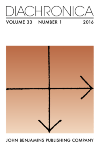
Diachronica
Bridging Linguistics and Philosophy for Deeper InsightsDiachronica is a prestigious academic journal published by John Benjamins Publishing Co that specializes in the fields of Linguistics and Philosophy. Established in 1984, it has become a significant platform for researchers and scholars to disseminate their work on language change and diachronic linguistics, offering insights into the evolution of languages over time. With an impressive impact factor and recognized rankings within the Q2 category for both Linguistics and Language as well as Philosophy in 2023, Diachronica offers a valuable resource for academics interested in the interplay between historical linguistics and philosophical discourse. Although the journal is not open access, it ensures that its articles are rigorously peer-reviewed and of high academic quality. For researchers, professionals, and students looking to deepen their understanding of language dynamics, Diachronica stands out as an essential component of the scholarly dialogue surrounding linguistic change.
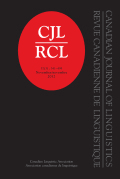
CANADIAN JOURNAL OF LINGUISTICS-REVUE CANADIENNE DE LINGUISTIQUE
Advancing linguistic frontiers with every issue.The Canadian Journal of Linguistics - Revue canadienne de linguistique is a prestigious peer-reviewed publication dedicated to advancing the field of linguistics. Published by Cambridge University Press, this journal has firmly established itself as a vital resource for researchers, professionals, and students alike, offering insights into a diverse range of linguistic studies and theories. With an impressive impact factor reflecting its academic rigor, the journal is ranked Q2 in the categorization of linguistics and language as of 2023, and holds commendable positions in both Scopus ranks for Arts and Humanities as well as Social Sciences. The journal's converged years span from 1996 to 2024, showcasing a rich history of contributions to the discipline. Although it currently does not offer open access, it remains highly influential. Located in Canada, the journal plays a crucial role in fostering scholarly communication within the linguistic community, making it an essential outlet for disseminating groundbreaking research and engaging discussions.

Mandenkan-Bulletin Semestriel d Etudes Linguistiques Mande
Charting New Territories in Mande Language StudiesMandenkan-Bulletin Semestriel d'Etudes Linguistiques Mande is an esteemed academic journal dedicated to the exploration of Mande languages and linguistics, published by the Centre National de Recherche Scientifique in France. With its ISSN 0752-5443, this journal has established itself within the linguistic community, holding a notable Q3 ranking in both the Linguistics and Language category as well as respectable standings in Scopus ranks, placing it in the 55th percentile for language and linguistics. Since its inception in 2018, it has been pivotal in publishing groundbreaking research that advances our understanding of the Mande language family and its cultural implications. Although currently not open access, the journal offers a wealth of knowledge fostered through rigorous peer-reviewed articles aimed at linguists, researchers, and students alike, making significant contributions to the fields of linguistics and African studies.
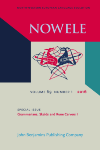
NOWELE-North-Western European Language Evolution
Unveiling the Rich Tapestry of Linguistic ChangeNOWELE-North-Western European Language Evolution, published by John Benjamins Publishing Co, serves as a vital platform for researchers and scholars interested in the evolution and dynamics of North-Western European languages. With an ISSN of 0108-8416 and an E-ISSN of 2212-9715, this journal has been contributing to the field of linguistics since its inception in 1983, with ongoing publications until 2024. Indexed in Scopus and classified in the Q3 category for Linguistics and Language, NOWELE is recognized for its rigorous academic standards and diverse contributions, ranking #485 out of 1088 in the Arts and Humanities category, and #566 out of 1167 in Social Sciences. The journal fosters an open dialogue within the linguistic community, presenting innovative research findings and theoretical advancements. Researchers, professionals, and students alike benefit from its systematic exploration of language evolution in the context of a rapidly changing global linguistic landscape.
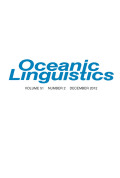
OCEANIC LINGUISTICS
Unveiling the Diversity of Oceanic LanguagesOCEANIC LINGUISTICS is a premier academic journal published by UNIV HAWAII PRESS, dedicated to the study of languages spoken in the Pacific region. This esteemed journal, bearing ISSN 0029-8115 and E-ISSN 1527-9421, serves as a vital platform for linguists, researchers, and scholars to disseminate significant findings and insights related to Oceania's rich linguistic diversity. With a commendable impact factor and categorized in the Q2 Quartile for the field of linguistics and language, OCEANIC LINGUISTICS ranks 335th out of 1088 in Arts and Humanities and 395th out of 1167 in Social Sciences, reflecting its relevance and influence in ongoing linguistic discourse. The journal is a subscription-based publication, committed to advancing research and fostering scholarly communication from 2004 to 2024, making it an essential resource for anyone engaged in the study of linguistic phenomena in the Oceania region and beyond.